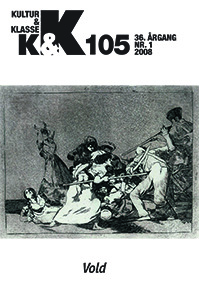»Thy Paleness Moves Me More than Eloquence«: Om Shakespeare som magtfuld forgænger og om voldsformer og genremæssig ustabilitet i The Merchant of Venice
DOI:
https://doi.org/10.7146/kok.v36i105.22044Nøgleord:
Thy Paleness Moves Me More than Eloquence, Shakespeare, magtfuld forgænger, voldsformer, genremæssig ustabilitet, The Merchant of VeniceResumé
»Thy Paleness Moves Me More than Eloquence«: On Shakespeare as a Powerful Precursor and on Forms of Violence and the Instability of Genres in The Merchant of Venice:
The article is about how Shakespeare is a precursor of ours whose works can still haunt us because, as Harold Bloom amongst others has pointed out, in uncanny ways they seem to be aware of, reflect and often even subvert the ideas, ideologies and anxieties of our modernity. The relationship between Marx/Marxism and Shakespeare is of specific interest in the article.
First, and following Peter Stallybrass, it is discussed how Marx appreciated Shakespeare in general and, more specifically, in a way rewrote Hamlet in The Eighteenth Brumaire of Louis Bonaparte, thus perhaps bearing witness to Marjorie Garber’s observation that this play is especially powerful in ensnaring us in its trap.
The main focus hereafter, however, is The Merchant of Venice, a play in which the power of money to regulate our ideas and ideals behind our backs is obviously a major theme. Following Simon Critchley and Tom McCarthy, it is sketched out to what extent money talks in the play, in effect stripping all ethical ideals and honourable intents and emotions of the characters of any credit whatsoever. Thus, violence permeates the play, since all relations depicted in it turn out to be coercive or manipulative – or something even more vile – in one way or another. In the famous court-scene, the character of Portia, who rhetorically praises the power of Christian mercy, even appears to be sadistic in a way which involves the audience too. In addition to this, the final trick with the rings, which Portia and Nerissa play on their husbands, is also of a quite sadistic nature.
Therefore, and following Daniel J. Korstein’s comments on the matter, it is not easy to determine whether one is witnessing – or being subjected to – a comedy or a tragedy or something entirely different. The only thing which is certain is that lofty political and ethical ideals are thoroughly debunked in and by this play which could be said to prefigure indirectly the unmasking of ideology which Marx endeavoured to carry out.
Downloads
Publiceret
Citation/Eksport
Nummer
Sektion
Licens
Tidsskriftet følger dansk ophavsret.





